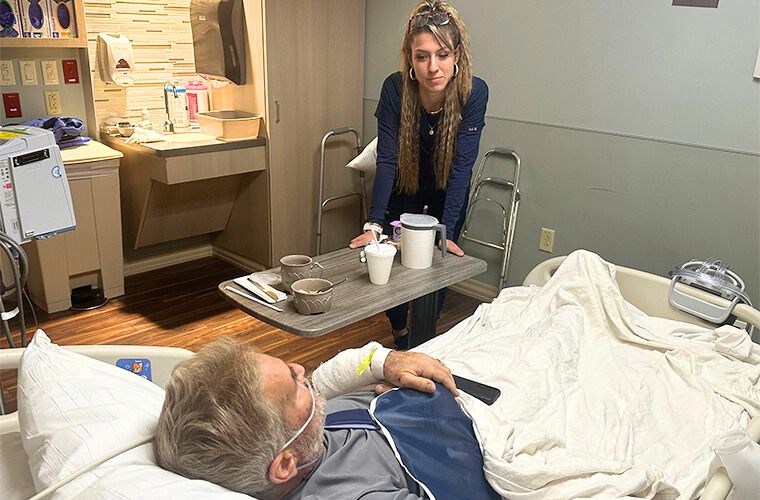BayCare's Peer Recovery Specialists Use Their Recovery Journeys to Inspire Patients

Katie Kavalar may only be in her 20s, but she has already walked in the shoes of many of the patients she sees each day at Morton Plant North Bay Hospital’s emergency room.
As a peer recovery support specialist and member of BayCare’s Behavioral Health division, Kavalar sees patients who have survived an overdose, are there under the Baker Act, a Florida law that allows for temporary detention and mental health care for people who cannot determine their own needs for treatment, or simply have a desire to get clean and sober.
BayCare has peer recovery support specialists available to patients in all its ERs across West Central Florida. These behavioral health professionals play a key role in improving the wellness of our communities because they have instant credibility with patients struggling with addictions.
Kavalar and the other peer recovery specialists can inspire and offer hope to patients because they all have been in the throes of addiction and are now walking their own recovery journeys.
When Kavalar introduces herself to a patient, she is seen as just another health care worker until she mentions she is in recovery. Just that small amount of information often makes the patient more receptive to Kavalar and the help she wants to offer.
Her Path to Addiction
Kavalar went from an active, popular teen in New Jersey to someone who became unrecognizable to her family. Kavalar’s dad was a police officer. Her mom was a doting mother. Kavalar played hockey like her older brother, but she was also a cheerleader. She loved people and saw the good in everyone.
“Unfortunately, I saw the good in the wrong crowd,” Kavalar admitted.
In middle school, she started hanging around a guy who took her to parties where there were illegal drugs.
“I never thought I would participate in drug use, but one night I tried it,” Kavalar said. “It just kept going and going and going until I was so deep into addiction. I was living in hotels, trying to survive for my addiction at such an early age.”
Kavalar lived in her addiction from age 14 to 18. On what she calls her last day of addiction, she fell asleep while driving. The last thing she remembers is seeing a car with children in it heading toward her. Fortunately, the driver avoided the collision. Kavalar only hit the curb, but she received her wakeup call.
“I threw up my hands, knowing what could have happened, and I told my parents, ‘I need help! I need help! I need help!’,” Kavalar recalled.
Her Journey to Helping Others
Her parents took her to a detoxification program and residential treatment in New Jersey, which sparked Kavalar’s passion to help people in recovery.
“The therapist tried to make recovery seem easy, but it was hard for me,” Kavalar said. “The behavioral health technicians, who were in recovery, would share their stories, while I shared mine. They seemed to understand what I was going through. They inspired me and others to stay sober.”
During treatment, Kavalar learned a great deal about the technicians’ career path. “I wanted to help people just like they had helped me,” she said.
When she finished the program, her mom moved her to Florida to be around extended family. She graduated from Palm Harbor University High School and eventually moved back to New Jersey to start college, majoring in addiction studies. Unfortunately, during that time she relapsed and at 21 years old, she began her recovery journey from square one.
Her Work at BayCare
That final relapse prompted a permanent move to Florida. A few years into her healing journey, Kavalar began to pursue her passion to help others with addictions by working at a detox program. She spent three years there before joining BayCare Behavioral Health in 2021.
Kavalar consults eight to 15 patients a day. She lets them know that inpatient and outpatient services are available and that she can bridge them to those services immediately. Of every 10 patients she sees, two to three may seek help. Some succeed and some relapse, but after speaking with Kavalar everyone knows recovery is possible.
“As a peer, Katie is more trusted by the patients. They understand she is there to help them and are more apt to communicate with someone they feel isn’t judging them,” said Monica Smith, Morton Plant North Bay Hospital’s ER manager. “Her work helps facilitate communication between the clinical team and patients, allowing for more opportunities of care.”
“Behavioral health professionals helped save my life, and now I have the privilege of trying to help others,” Kavalar said.
About BayCare’s Behavioral Health Services
BayCare Behavioral Health has been offering mental health and substance use services in the Tampa Bay area since 1971. Services include inpatient and outpatient psychiatric services, residential services, housing programs, crisis stabilization and mobile response, peer recovery services, and prevention and outreach.
Kavalar’s work is part of BayCare Behavioral Health’s hospital bridge programs that connect patients to the services they need. Additional BayCare Behavioral Health programs that provide peer recovery support are Family Intensive Treatment Team (FITT), Medication Assisted Treatment (MAT), Certified Community Behavioral Health Clinic (CCBHC), Urgent Family Care, Florida Assertive Community Treatment (FACT) and Center for Behavioral Health’s Peer Recovery Center.
In August 2024, BayCare Behavioral Health peer recovery specialists screened 310 individuals through the hospital bridge program. Of those, 242 were identified as having a substance use disorder diagnosis, and of those 106 were referred to a MAT provider or local provider for substance use treatment.
For more information: BayCare Behavioral Health’s Addiction Services
